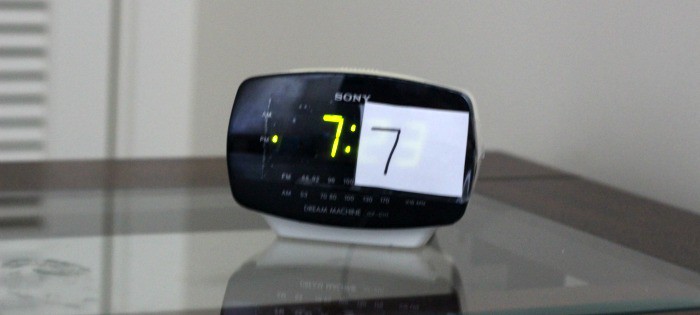Inside this post: Whether you have a school-aged, preschool-aged or toddler waking up too early, you’ll learn how much sleep kids need and how to use a kids wake up clock to stop kids from waking up too early.
The first time it happened, my husband was deployed. At exactly 3:37 am my son was exactly 3 inches from my face.
I jolted upward 90 degrees, “Goodness. Are you okay?!”
He looked at me like this was totally normal (it wasn’t). Like we do this all the time (we don’t). Like he was supposed to climb into bed with me (no, no, noooooo).
For a split second, I hesitated because…Was I really going to go down this road?
He laid next to me, looking all sweet and cuddly. Plus, my husband’s side of the bed was vacant.
“Okay, okay. You can stay,” I said.
You know how this goes, right?
Over the course of the following month, I laid awake with a drunken octopus, regularly receiving kicks in the spleen. I finally got him back to sleeping in his own bed but he was waking up wayyyy too early in the morning.
He went from sleeping until 7 am each morning (or at least waking and waiting for me to get him) to waking at 5 am.
Getting him to sleep until 6:30 am felt like a dream that was never going to happen.
And mama was tired.
Related: How to Respond When Your Child is Afraid to Sleep Alone

post contains affiliate links, see my disclosure here.
What to do when kids wake up too early.
Feeling frustrated, a friend of mine shared some advice with me. I gave her method a try, adding my own twist. Not only did it work, but it worked brilliantly.
Here’s how you can implement it too…
From newborn baby sleeping tips to helping kids fall asleep fast, the first thing I do when tackling a sleep challenge is to look at overall sleep needs compared to actual sleep.
Here’s the recommended / average sleep by age:

If your child falls into the ages 6-7 range, then you’ll want to shoot for 10-11 hours per day. For most toddlers and preschoolers, a good ballpark to aim for is around 12 hours per day total.
In my situation, he was going to bed around 7:00 pm and waking at 5:00 am. He no longer naps and by dinner he was a hot mess. So, he definitely needed more sleep according to both the sleep chart and observation.
Teaching kids to sleep later.
I took a very specific Language of Listening® approach when coaching our him to stop waking up too early.
(We used the same exact method when teaching him to follow a set of printable picture routine cards at bedtime.)
1. Collect your supplies.
You’ll need a basic digital alarm clock, a piece of paper, a sharpie and clear packing tape. You could also use a color-changing wake up clock if your child is under the age of three, and they understand colors better than numbers.
2. Set up the clock together.
Together we plugged the clock in. I set the time. Then I grabbed my piece of paper and wrote the number seven on it. I cut it out and taped the seven over the minutes part of the clock so that is was parallel to the hours.
If the minutes shine through the paper, card stock or photo matte paper works great too.

3. Explain what is about to happen.
I like to talk about things a day or two ahead of time before implementing anything. This gives lots of repetition for the information to sink in. Two days before we officially gave this a whirl, I walked my son into his room and said…
“You’re going to learn how to wake up in the morning all by yourself. This clock is going to help you know when it’s morning time. When the clock has two sevens that means it’s time to wake up!”
Throughout the day, I would talk about the special alarm clock and how he was going to know when it was time to wake up all by himself.
Related: My All-Time Favorite 2 Year-Old Sleep Schedule
4. Coach again right before bedtime.
Once I was ready to get started, I reminded him right before bedtime, “It’s time to wake up for the day when you see two sevens on the clock.”
I added that it was okay to come and get me if he needed me or needed to use the bathroom.
(I always want him to feel safe to get me!)
If he doesn’t need anything or I am able to meet his needs, then I take him back to bed and remind him that he can wake up for the day when there are two sevens.

5. Coach again in the morning.
Most kids won’t get it right away. This is totally normal, especially if you have a strong-willed child.
I add in some extra coaching in the morning to help. For the first two days, he still woke up early and came into my room. Once I knew he was okay and his needs were met, I walked him back to bed and said…
“I see a five and a seven on the clock. When there are two sevens, you can get up for the day. It’s still nighttime.”
Slowly but surely, the time he tried to come out of his room got closer to seven. It can take up to two weeks for your child’s sleep clock to reset itself.
And typically over time, when kids realize there isn’t anything exciting happening at 5:30 am, they will start to sleep later. Plus, if they aren’t eating at 5:30 am, their metabolism will start to reset as well, signaling them wake up to eat breakfast later.
Within two weeks, he was sleeping until 7:00 each day. If he woke up early, he would play with quiet toys in his bed and wait to greet us with his sunny rays of personality.
(We always allow both kids take quiet toys to bed. That way they can play before bed and when they wake up, while still abiding by our boundary of staying in their rooms.)
Related: 2 Year Old Sleep Regression Explained. Why It Happens and Solutions.
6. Reinforce the behaviors you like.
Naming your child’s strengths is a huge part of Language of Listening®. I always try to recognize and name the behaviors I like. Each time my son stayed in his room until 7:00 am and waited until there were “two sevens,” I named those strengths…
“Wow. You know when it’s time to wake up for the day. That shows you’re independent.”
“You waited until there were two sevens on your clock. You figured it out!”
“You slept all night in your own bed. That took a lot of self-control. Wow.”
One month later.
We stuck with it for one month, consistently returning him to bed if he woke up too early. Now, there is rarely a day when he gets out of bed before 7:00 am.
Some days I even have to wake him!
You can choose whatever wake up time works for you and your family. I’ve had several friends try this method, and gradually, little-by-little, they are seeing the same results with their kids!
(And psst…we also use these printable routine cards for smoother mornings and bedtimes in our home. Works like magic!)

Print this free toddler listening checklist.
This post comes with a free printable checklist to help with toddler listening. I always have the hardest time remembering these phrases. This printable simplifies it!
Here is a sneak preview…
Download Your Free Printable
- Download the checklist. You’ll get the printable, plus join 37,000+ parents who receive my weekly parenting tips and ideas!
- Print. Any paper will do the trick, but card stock
would be ideal.
- Place it on your refrigerator. Check things off as you go and don’t forget a thing!
Want more on parenting?
- How to Get Your Child to Follow a Routine Without Reminders
- Best Morning Routine Tips and Tricks Your Kids Will Actually Follow
- One Simple Trick to Help Kids Fall Asleep Fast
- The Real Reason Kids Never Want to Go to Sleep
- 3 Mom Tricks to Help Kids Stay in Bed
I've created a free email series just for you! If you are struggling with finding a routine, rhythm or schedule, this email series will help you find one that will work for YOUR family. Yes, really. I've seen my sample routines work time and time again for parents. I know it can work for you too.
This free email series will help you:
- Free sample routines for your child
- Best morning routine tips and tricks your kids will actually follow
- All-time favorite parenting hacks for getting more cooperation at bedtime
- Step-by-step guide for using a printable daily schedule with kids










Hi Lauren! I always enjoy checking your blogs for tips 🙂 I was curious if you have some sort of night light for you’re kids so they can see the numbers on the clock? Or is it just the light off the clock that helps? Our 32 month old boy sleeps in a pitch black room, still in a crib, and has been waking up before or close to 5:30 a lot lately. He typically sleeps 9-9.5 hours at night and naps for 2.5 hours a day. I’m not sure I’d we need to start cutting his naps or what to do. We don’t get him outs of bed until 6-6:30. He is fully potty trained so sometimes he needs to go to the bathroom sooner, but I just put him back in his bed after that until his usual wake time. We don’t have breakfast until 7-7:30. Any ideas? I’m interested in trying the clock, but curious about light exposure. Thanks! 🙂
I now recommend the stoplight alarm clock for kids. You can find it on Amazon via my referral link here: https://amzn.to/2SFcSxE. It has a red light which will not disrupt sleep and your child can see the numbers. The visual of the stoplight is very easy for children to understand and use until the numbers make more sense.
We’ve found that our daughter sleeps much more soundly and gets back to sleep more easily after stirring if she can’t see us. This obviously won’t work if you share a bed, but if he’s in a bassinet or crib in the same room, try setting up a cardboard screen between him and your bed. It worked wonders for us.
Hi, we used a Gro clock with our daughter and it worked brilliantly. She understood it.
My son however, doesn’t and is waking ridiculously early. The problem is they share a room. We lie with him but he doesn’t go back to sleep and rather than wake his sister we bring him downstairs which I know is reaffirming that he can get up but his 7 year old sister needs her sleep. We’ve tried delaying his bedtime and reducing his nap during the day which seems to have helped with him sleeping through the night but the early starts are taking its toll. This morning it was 4:45am! Any advice would be greatly appreciated. Thank you.